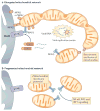Mitochondria in innate immune responses
- PMID: 21597473
- PMCID: PMC4281487
- DOI: 10.1038/nri2975
Mitochondria in innate immune responses
Abstract
The innate immune system has a key role in the mammalian immune response. Recent research has demonstrated that mitochondria participate in a broad range of innate immune pathways, functioning as signalling platforms and contributing to effector responses. In addition to regulating antiviral signalling, mounting evidence suggests that mitochondria facilitate antibacterial immunity by generating reactive oxygen species and contribute to innate immune activation following cellular damage and stress. Therefore, in addition to their well-appreciated roles in cellular metabolism and programmed cell death, mitochondria appear to function as centrally positioned hubs in the innate immune system. Here, we review the emerging knowledge about the roles of mitochondria in innate immunity.
Conflict of interest statement
The authors declare no competing financial interests.
Figures




References
-
- Hayden MS, West AP, Ghosh S. NF-κB and the immune response. Oncogene. 2006;25:6758–6780. - PubMed
-
- West AP, Koblansky AA, Ghosh S. Recognition and signaling by Toll-like receptors. Annu Rev Cell Dev Biol. 2006;22:409–437. - PubMed
-
- Kerrigan AM, Brown GD. Syk-coupled C-type lectin receptors that mediate cellular activation via single tyrosine based activation motifs. Immunol Rev. 2010;234:335–352. - PubMed
-
- Bonawitz ND, Clayton DA, Shadel GS. Initiation and beyond: multiple functions of the human mitochondrial transcription machinery. Mol Cell. 2006;24:813–825. - PubMed
Publication types
MeSH terms
Substances
Grants and funding
LinkOut - more resources
Full Text Sources
Other Literature Sources
Medical

